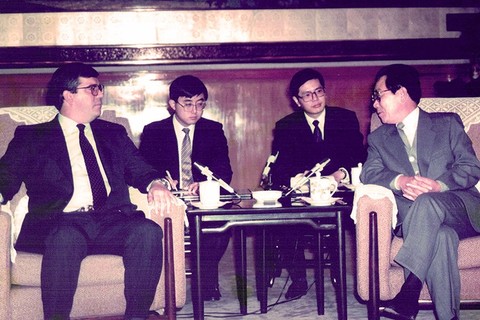<< Read all John Kamm Remembers stories

After his early trips to Guangdong in the first half of 1991, Executive Director Kamm headed north to Beijing to discuss human rights and raise the names of prisoners. In May of that year, a senior official of the Supreme People’s Court told Kamm that the case of the Li brothers—two young Hunan labor leaders—would be settled. They were released shortly after his visit.
Kamm’s host in Beijing in the early 1990s was the China Council for the Promotion of International Trade (CCPIT), an organization that Kamm had extensive dealings with in the 1970s and 1980s in his capacity as an officer of the National Council for US-China Trade, based in Washington DC, and the American Chamber of Commerce in Hong Kong.
Of the many meetings the CCPIT organized for Kamm during the early 1990s, none was more important than the meeting with Communist Party of China Politburo Standing Committee member Li Ruihuan on November 25, 1991. The meeting was held in the Great Hall of the People, and representatives from central government ministries, including the State Council Information Office, the Ministry of Foreign Affairs, and the Ministry of Justice, were present. (Li was a carpenter who helped build the Great Hall.)
The meeting began with Li Ruihuan thanking Kamm for helping to preserve China’s trade in the United States. Kamm responded by thanking Li for China’s decision to drop charges against labor leader Han Dongfang and to allow the early release of student leader Wang Youcai. Kamm argued that more of these releases would translate into better prospects for approval of Most Favored Nation tariff status.
“Releasing people from prison is no big deal,” Li replied. He said that when foreigners come to China and ask “why” (wei shenme) we don’t release such and such a person, we reply “for no particular reason” (bu wei shenme). Sometimes releases become more difficult when foreign governments are vocal about a specific case, since Chinese leaders never want to appear to give in to foreign government demands.
Li went on to say that the Chinese government was well aware of American concerns about particular prisoners. Some Chinese leaders have asked, when reflecting on President Nixon’s visit to China in 1972, why neither Deng Xiaoping nor Hu Jintao, both in jail at the time, had their cases raised by American visitors.
Li went on: “It’s true that Americans often don’t understand how the Chinese people feel. But it’s also true that Chinese often don’t understand how American people feel.”
Li recounted that upon President Nixon’s arrival in China, he was driven to the Diao Yu Tai Guesthouse. Opposite the entrance of the guesthouse was a large concrete sign proclaiming in Chinese characters, “We Will Definitely Liberate Taiwan!” When Nixon was given a translation, he was furious. Premier Zhou Enlai immediately rushed to the President’s suite and asked him not to pay attention to such slogans: “They are empty cannons!”
When Kamm met with Li in November 1991, Beijing was in the grip of a campaign against “spiritual pollution” and littered with slogans. Everyone in the room chuckled at Li’s reference to “empty cannons.” Shortly after the meeting, Kamm was authorized to ask about and receive information on prisoners from the Ministry of Justice and to visit Chinese prisons under their management.
Listen to the Encounters with China podcast.
Subscribe to receive notifications about new episodes.
Read all John Kamm Remembers stories.
